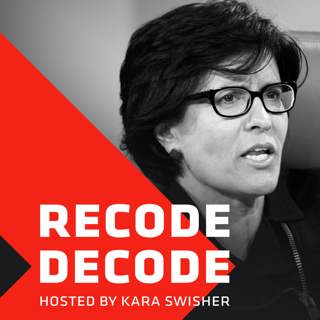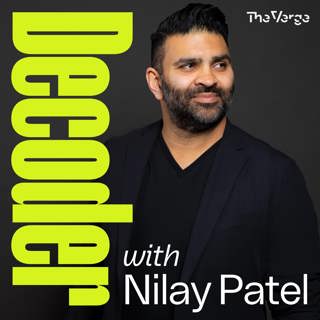
Recode Decode: Chuck Todd, moderator, 'Meet the Press'
NBC News Political Director Chuck Todd talks with Recode's Kara Swisher about how he's evolving what it means to be the host of the longest-running series in TV history, "Meet the Press." Todd discusses how a childhood interest in politics led him to Washington, D.C., and how a lucky break at the pioneering digital service Hotline led him to NBC. He also talks about how technology accelerated trends of political polarization that began during Watergate and why social media has "peaked" in politics. Plus: Why the "best and the brightest" don't come to Washington anymore, and should anyone in Silicon Valley run for office? Learn more about your ad choices. Visit podcastchoices.com/adchoices
29 Jan 20181h 9min

Recode Decode: Alexandra Petri, columnist, the Washington Post
Alexandra Petri, who writes the Compost blog for The Washington Post, talks with Recode’s Kara Swisher and Chorus CEO Dick Costolo about making fun of politics. Petri says some politicans have a sense of humor about her columns, but others don’t like it or don’t get the joke — the Trump White House once distributed one of her satirical pieces to journalists, mistaking it for earnest praise. She explains how she became a humor columnist, how she comes up with ideas and where she finds the funny in the Trump family and the Trump White House. Plus: Petri’s pitch for a romantic comedy about a Supreme Court justice. Learn more about your ad choices. Visit podcastchoices.com/adchoices
24 Jan 201852min

Recode Decode: Andrew Keen, author, 'How to Fix the Future'
"How to Fix the Future" author Andrew Keen talks with Recode's Kara Swisher about his new book, which examines reasonable solutions to the social and political disruptions created by the digital revolution. Keen says tech is neither the solution nor the scapegoat for all problems, urging Silicon Valley to look to history for answers. In the book, he examines four categories of things that need fixing: Economic inequality; the "imminent crisis" of jobs; the rise of surveillance capitalism, in which consumers pay for free products by trading away their personal data; and a cultural crisis of incivility, divisiveness and "fake news." Plus: Why Amazon CEO Jeff Bezos is best positioned to set an example for the rest of the industry and why Keen believes Facebook CEO Mark Zuckerberg is "re-arranging the deck chairs on the Titanic." Learn more about your ad choices. Visit podcastchoices.com/adchoices
22 Jan 20181h 3min

Recode Decode: Gregg Spiridellis, CEO, JibJab
JibJab CEO Gregg Spiridellis talks with Recode’s Kara Swisher and Chorus CEO Dick Costolo about how the company has adapted to the ever-changing internet over the past two decades. JibJab was on the verge of shutting down when it released “This Land,” an animated viral video sensation that parodied the 2004 U.S. Presidential race between George W. Bush and John Kerry. JibJab later moved into personalized greeting cards and apps for messaging platforms, which Spiridellis says is a low-risk way to make comedy scale. He says it’s harder than ever to justify the production costs of “mass funny” digital videos, because creators are now competing against the entire history of comedy, available for free on YouTube. Learn more about your ad choices. Visit podcastchoices.com/adchoices
17 Jan 20181h 2min

Recode Decode: David Friend, author, ‘The Naughty Nineties’
David Friend, Vanity Fair’s editor of creative development, talks with Recode’s Kara Swisher about his new book, “The Naughty Nineties: The Triumph of the American Libido.” Much of today’s social and political unrest can be traced back to the sea change in who Americans voted for and how they consumed entertainment in the 1990s — and it’s no accident that the world wide web was born in that decade. He explains why today’s #MeToo movement owes a debt to Anita Hill, who unsuccessfully tried to stop Clarence Thomas’s nomination the Supreme Court in 1991, and how everyone from Bill Clinton to Lance Armstrong ushered in an “age of lies” that paved the way for Donald Trump. Learn more about your ad choices. Visit podcastchoices.com/adchoices
15 Jan 20181h 1min

Recode Decode: Sarah Cooper, author, "100 Tricks To Appear Smart in Meetings”
Comedian Sarah Cooper talks with Recode’s Kara Swisher and Chorus CEO Dick Costolo about why she left a career in the tech industry to become a stand-up comic. Cooper has made tech a central part of her comedy and has written a book based in part on her time at Yahoo and Google called “100 Tricks To Appear Smart in Meetings.” The group debates whether people who work in tech are funny (on purpose) and whether depictions of them in popular culture, on shows like HBO’s “Silicon Valley” or CBS’ “The Big Bang Theory,” are really hitting their mark. Plus: Cooper previews her next book, “How to Be Successful Without Hurting Men’s Feelings,” which will include tips such as “be authentic by hiding yourself." Learn more about your ad choices. Visit podcastchoices.com/adchoices
10 Jan 20181h 8min

Recode Decode: Patty McCord author of "Powerful"
Patty McCord, the former chief talent officer at Netflix and author of that company's famous "culture deck," talks with Recode's Kara Swisher about her new book, "Powerful: Building a Culture of Freedom and Responsibility." McCord recalls how CEO Reed Hastings convinced her to work at Netflix and how they developed the principles of the company's culture over many years — which Hastings unilaterally published online, generating millions of downloads. She also talks about the common mistakes companies make when hiring and firing, why coddling employees with Google-style perks is overrated and how businesses can make lasting change in the aftermath of the #MeToo movement. Learn more about your ad choices. Visit podcastchoices.com/adchoices
8 Jan 20181h 7min

Recode Decode: Dick Costolo, CEO, Chorus
Chorus CEO Dick Costolo, the former CEO of Twitter, talks with Recode's Kara Swisher about why he loves comedy and why his peers in the tech community are so infrequently "in on the joke." Before he was a tech entrepreneur, Costolo wanted to be a comedian, taking improv classes at Second City in Chicago in the hopes of one day making it to "Saturday Night Live." Today, he explains, more people than ever have the ability to succeed in comedy because they can make and distribute their comedy online, rather than needing to go to Second City or be a touring stand-up comic. Costolo also talks about what happened when he left Twitter and how he became an advisor to the writers of HBO's "Silicon Valley" during that show's third season. Learn more about your ad choices. Visit podcastchoices.com/adchoices
3 Jan 20181h 4min






















